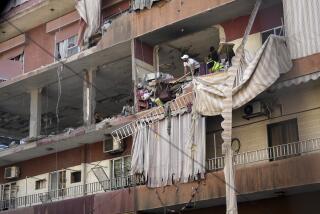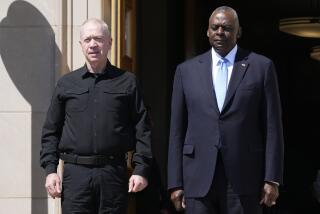Peres’ Allies Raising Specter of War if Negotiations Fail
- Share via
JERUSALEM — Publicly and privately, prominent Israeli supporters of Foreign Minister Shimon Peres’ Labor Alignment have in recent days raised the specter of a new Arab-Israeli war as the likely result if there is no breakthrough soon in the deadlocked Middle East peace process.
The move comes amid an apparent Israeli stalemate over the latest American peace initiative, which Peres supports but which his archrival, Prime Minister Yitzhak Shamir, opposes in its present form. It also coincides with recent public opinion polls here showing both Peres and his party slipping badly compared to Shamir and his rightist Likud Bloc.
Shamir’s spokesman, Avi Pazner, charged in an interview Tuesday that “prophets of doom” are trying “to frighten public opinion . . . to stampede the government into agreeing to things which are not yet right.”
Speculative Scenario
But the Labor scenario, while obviously speculative, appeals to a basic conviction among some military and other analysts that a prolonged deadlock will only encourage dangerous extremism--and it is a theme that may be heard more frequently in the days and weeks ahead.
Brig. Gen. Efraim Sneh, the retired former head of the Israeli military government in the occupied West Bank, said in an interview: “If we miss (the latest U.S.) offer, it’s a tragedy. The result is thousands of people in the grave.”
He referred to a plan being promoted by Secretary of State George P. Shultz, who is visiting five countries this week in an effort to find support for the plan.
Sneh predicted that if Shultz fails, it will only encourage more unrest in the occupied territories, where at least 132 Palestinians and one Israeli soldier have been killed in the last four months. The government will have to take even harsher measures to quell the uprising, feeding a vicious cycle of violence, he said.
Thus, Sneh added, Israel “will become more isolated from its friends,” who will find it difficult to support its tactics. And those Arab countries now inclined to explore the peace process “will disengage from it,” so that “within a few years a new Arab coalition will be formed, united on the Palestinian issue” and with Syria as its pivot, he said.
It is a scenario for disaster, Sneh concluded, adding, “I feel when there is an isolated Israel and a united Arab world, the inevitable result is another Arab-Israeli war.”
The retired general is not the only one making essentially this case, however. In an interview last week with the Hebrew-language newspaper Maariv, Avner Regev, a Middle East specialist and co-director of a Labor-affiliated think tank, said Israel might even feel so much pressure that it would initiate a new war.
The government is under three-pronged pressure, Regev said--the American initiative, the uprising in the occupied territories and the demands of those who seek a settlement at any price.
“These three pressures might push in the direction of another war, initiated by Israel, whose purpose would be to relieve these pressures,” he told Maariv. “The war will be used for another mission which cannot be performed at other times, which is to push the Arab population (in the occupied territories) to the other side of the Jordan River, claiming that they are dangerously hostile.”
A senior government official close to Peres, who agreed to be interviewed on condition of anonymity, also raised the prospect of a regional explosion.
“There have always been three conditions present when there has been war in the region,” he said. “The first is a perception of a U.S.-Israeli rift. Second is a perception of internal Israeli weakness. And third is the appearance of new military technology.
“All three are present now,” the official said, noting that ground-to-ground missiles, like those being used in the Iran-Iraq War or being installed in Saudi Arabia, constitute a new military threat.
But Pazner, Shamir’s spokesman, took issue with these analyses. “In all the wars we have had before, the Arabs have always started whenever it was convenient for them,” he said. “We were not isolated.”
However, he warned, such dire forecasts “can be self-fulfilling.” He continued: “Those prophets of doom are not doing their country a service. On the contrary . . . they play a very dangerous game with these stupid ideas.”
More to Read
Sign up for Essential California
The most important California stories and recommendations in your inbox every morning.
You may occasionally receive promotional content from the Los Angeles Times.










